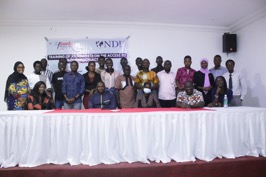
The event, held at Metzy Hotel, brought together 20 journalists drawn from the print, online and electronic media houses to better prepare themselves with the necessary reporting tools in the preparation for the implementation of ATI in the country.
Lala Touray, Senior Programme Associate at NDI, explained that NDI provided mini-grant funding to the GPU to train journalists, civil society activists, and government information officers on the Access to Information Act, 2021.
She added that the project seeks to support the implementation of the Gambia’s Access to Information Act, 2021, and to encourage the use of the legislation to promote transparency and accountability in government.
She reiterated that the training of journalists on the ATI legislation is important as it will help journalists understand the context of the law and be able to use the knowledge gained to create public awareness about the law, its application, use and benefits.
“Building on the successes of the Access to Information legislation, NDI is working with the Office of the President, as well as the Ministries of Justice (MoJ), Finance (MoFEA), and Information (MoIn), and CSOs to enhance government communication and public engagement, and to establish and promote a reform action plan in The Gambia to guide the collective efforts of both government and CSOs to enhance transparency reforms,” she stated.
John Charles Njie, Chairperson of the CSOs Coalition on ATI, emphasised that journalists should be able to ask hard questions, adding that there is a grace period for the implementation of the access to information law.
By February 2023, he said, they should have had an Information Commission but hinted that they are yet to hear any information regarding the establishment of such a Commission.
“Therefore, questions need to be asked. I hope, from this training, journalists will look at the law, and each and every one of you will be writing stories that look into the status of implementation of the ATI law. If we do not put pressure on our authorities, the process of implementation of the law will continue to drag or even possibly derailed,” he said.
He also urged journalists to serialise sections of the ATI law in order to create public awareness.
He further told journalists to amplify media coverage on the right to information, the benefits of access to information, and how people can utilise the ATI law to ensure transparency and accountability in government.




